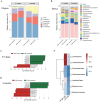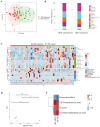Maternal group B Streptococcus decreases infant length and alters the early-life microbiome: a prospective cohort study
- PMID: 39693119
- PMCID: PMC11656753
- DOI: 10.1080/07853890.2024.2442070
Maternal group B Streptococcus decreases infant length and alters the early-life microbiome: a prospective cohort study
Abstract
Background: Maternal colonization with Group B Streptococcus (GBS) disrupts the vaginal microbiota, potentially affecting infant microbiota assembly and growth. While the gut microbiota's importance in infant growth is recognized, the specific effects of maternal GBS on growth remain unclear. This study aimed to explore the effects of maternal vaginal GBS during pregnancy on early infant growth, microbiome, and metabolomics.
Methods: We recruited and classified 453 pregnant women from southern China into GBS or healthy groups based on GBS vaginal colonization. Their infants were categorized as GBS-exposed or GBS-unexposed groups. We comprehensively analyzed infant growth, gut microbiota, and metabolites during early life, along with maternal vaginal microbiota during pregnancy, using 16S rDNA sequencing and targeted metabolomics.
Results: GBS-exposed infants exhibited lower length-for-age z-scores (LAZ) than GBS-unexposed infants, especially at 2 months. Altered gut microbiota and metabolites in GBS-exposed infants correlated with growth, mediating the impact of maternal GBS on infant LAZ. Changes in the vaginal microbiota of the GBS group during the third trimester correlated with infant LAZ. Additionally, differences in neonatal gut microbiota, metabolites, and vaginal microbiota during pregnancy were identified between infants with overall LAZ<-1 within 8 months after birth and their counterparts, enhancing the discriminatory power of fundamental data for predicting the occurrence of LAZ<-1 during the first 8 months of life.
Conclusions: GBS exposure is associated with decreased infant length growth, with altered microbiota and metabolites potentially mediating the effects of maternal GBS on offspring length growth, offering potential targets for predicting and addressing growth impairment.
Keywords: Group B Streptococcus; gut microbiota; infant growth; length-for-age z-score; vaginal microbiota.
Conflict of interest statement
The authors affirm that there are no conflicts of interest related to the publication of this paper. No financial, professional, or personal relationships could influence the work or its conclusions. The article is not under consideration for publication elsewhere in a similar form in any language.
Figures






References
-
- Prevention of perinatal group B streptococcal disease: a public health perspective. Centers for Disease Control and Prevention. MMWR Recomm Rep. 1996;45(RR-7):1–24. - PubMed
-
- Prevention of Group B streptococcal early-onset disease in newborns: ACOG committee opinion, number 797. Obstet Gynecol. 2020;135(2):e51–e72. - PubMed
MeSH terms
LinkOut - more resources
Full Text Sources
Other Literature Sources
Medical
